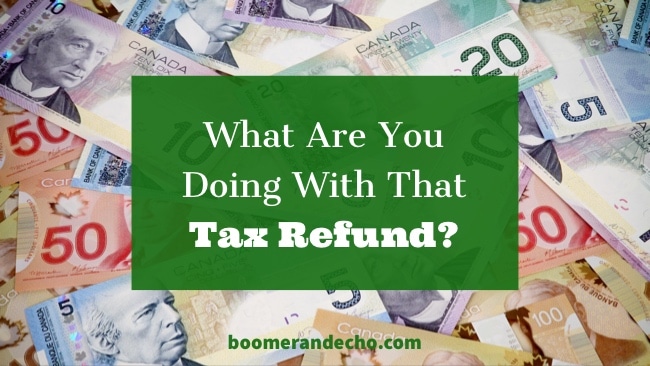**This is a sponsored post written by me on behalf of Alterna Bank. All opinions are my own.
Canadians are usually an optimistic bunch come tax season, with the majority of tax filers expecting to get a refund. In fact, many of us count on a tax refund to pay off debt, cover the cost of a vacation, or to further our savings goals.
Most financial experts, including me, will tell you that getting a tax refund is not necessarily a good thing – more like a case of bad tax planning.
A tax refund means that you paid more than your fair share of taxes throughout the year, essentially lending the government an interest-free loan with your own money!
That doesn’t stop the majority of us from getting excited – down right giddy – over the prospect of receiving a big, fat, juicy tax refund. But, given the knowledge that a tax refund is just the government giving back your hard-earned dollars, what you do with that refund can make a big difference in your finances.
What To Do With That Tax Refund?
Let’s say after filing your taxes you expect to receive a $3,600 refund later this spring. What that really means is you overpaid your taxes by $300 per month last year.
Now think about what you want to do with that refund. $3,600 is a lot of money to receive in a lump sum and it’s precisely the type of refund that gets people thinking about buying a new television or going to Las Vegas for an epic long-weekend.
We’ve already established that getting a big tax refund is not a good thing. It means you’re paying too much tax, or more likely, your employer is withholding too much tax at the source.
If you make regular RRSP contributions, for example, or expect to pay a lot in child-care expenses, then you should fill out form T1213 (Request to Reduce Tax Deductions at Source) and then ask your employer to reduce the amount of taxes withheld on your paycheque.
With proper tax planning like this you might have been able to save that $300 per month last year. In this case, would you sock away $300 every month to save up for a new TV or a trip to Vegas in the spring? Probably not. So why do we feel it’s okay to spend our tax refund on a large impulse purchase?
Want a more responsible plan for your refund? Here’s a list of smart things to do:
- Pay off credit card debt
- Pay down a line of credit
- Put a lump sum onto your mortgage
- Spend some and invest the rest
- Invest it back into your RRSP
- Contribute to your TFSA
- Contribute to your child’s RESP
- Donate it to a registered charity
Another option is to do nothing. What I mean by that is you might not have a financial goal that requires your immediate attention, but you’ll eventually need to access the cash.
Maybe you need to start an emergency fund or build on an existing one. Or, perhaps you want to buy a house in two or three years and need to add to your down-payment fund. Maybe you’re planning a summer holiday and need to save some cash for a few months.
In this case the best place to park your refund is inside a high interest savings account – one that gives you a chance to earn a decent interest rate.
One to consider is Alterna Bank, which has a Tax-Free eSavings Account and High Interest eSavings Account that both pay 2.35%* interest. Both accounts have no fees and no minimum balance requirements which makes them ideal for short-term savings. Online banks like Alterna consistently offer higher every day interest rates with no gimmicks and no teasers. Equally as important, they are CDIC insured.
Final thoughts
Although we tend to get excited about the idea of a large tax refund hitting our bank account in April it’s important to understand where that tax refund comes from – you are paying too much in taxes throughout the year.
Getting a tax refund is not an excuse to throw caution to the wind and spend more just for the sake of spending. In fact, if you’re serious about getting the most out of your RRSP contributions then the responsible thing to do is to take your entire refund and put it right into your RRSP.
Less optimal, but perhaps equally responsible is to put that refund into your TFSA or onto your mortgage as a lump sum payment.
Finally, if you just want a place to stash your cash and earn some interest for the short-term, look for a high interest savings account.
Remember, a tax refund is not a windfall or free money from the government. It’s your money! You lent it to the government and now they’re giving it back to you. Now is your chance to put that money to good use.
*Interest is calculated daily on the closing balance and paid monthly. Interest rate is annualized and subject to change without notice.
